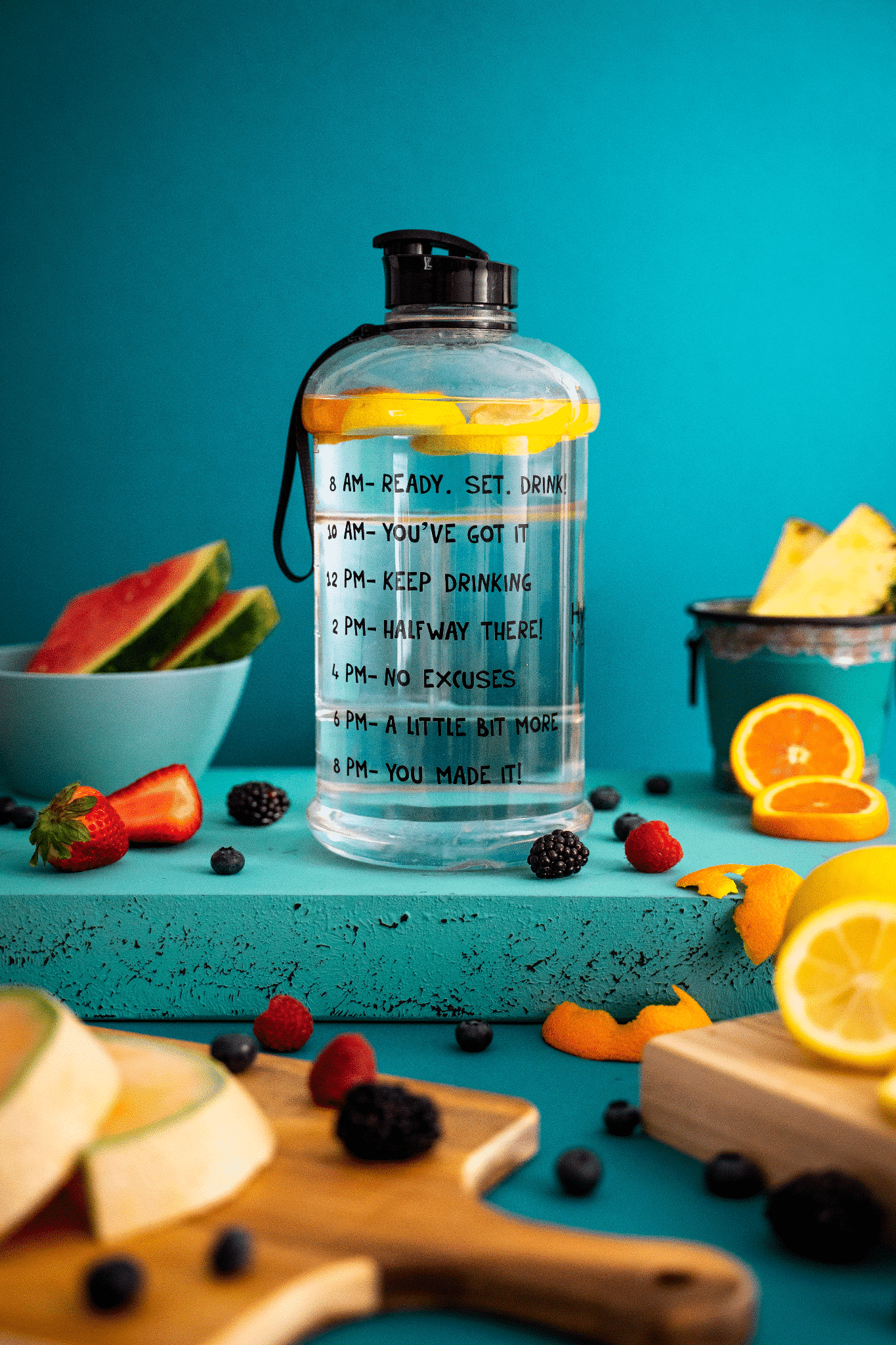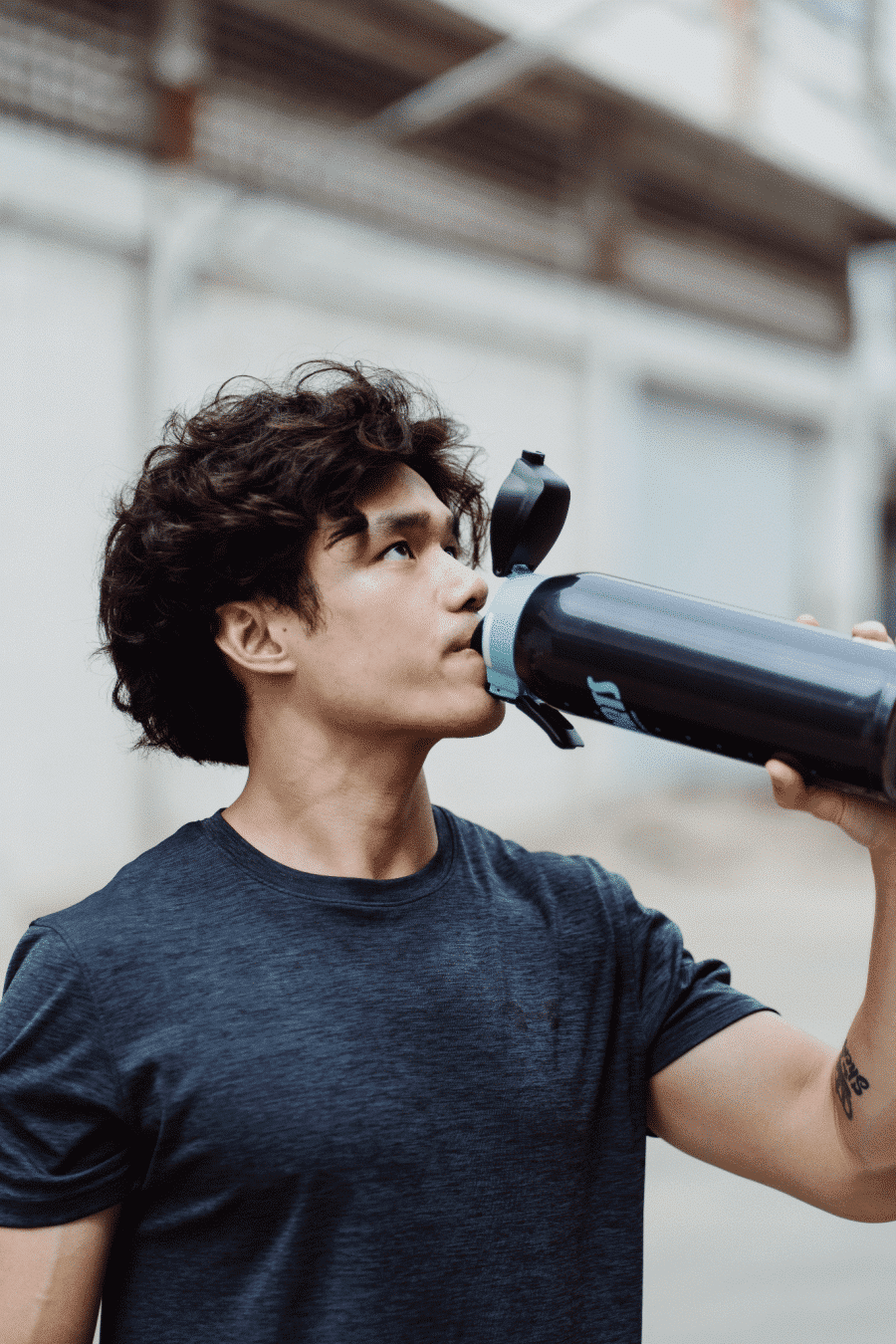You may easily get dehydrated if you do not drink enough water or other fluids. Rehydration is essential after any activity that causes sweating or physical effort, like a workout, sports, sauna, etc. If you want to find out how to rehydrate fast at home, you are at the right place.
This article will provide you with some tips on how to recognize dehydration and how to super hydrate your body.
Let’s dive in!
How to Rehydrate Fast at Home
Remember that your body needs to be hydrated to function properly. Water is one of the most important substances for humans. Besides drinking water, there are several other ways to rehydrate, such as eating fruits and taking oral rehydration solutions.
To rehydrate fast at home, you need to drink water, unsweetened sports drinks, skim or low-fat milk and tea, eat fruits and vegetables or soup, as well as take oral rehydration solutions.
If you do not consume vitamins, drink enough water, and other fluids, you might receive it with the help of the Drip IV infusion.
Tips and Tricks for Rehydrating Fast at Home
Water is an essential component in your body since it maintains body temperature, carries nutrients, eliminates toxins, and regulates metabolism. People lose water every day, so it is important to hydrate.
Regular physical activity is also important for a healthy life. However, the body dehydrates due to sweating. Dehydration, which is defined as a state when your body loses more fluids than it takes, leads to various health issues, such as headaches, fatigue, kidney stones, constipation, dry skin, etc.
That is why replacing the body fluids we lose is always important. Check these effective ways to help you rehydrate.
Drink plenty of water
The easiest way to hydrate at home is to drink water. Drinking water frequently during the day is crucial, especially when you feel dehydrated. Doctors recommend drinking at least eight glasses of water daily 1healthline, besides drinking other fluids and eating fruits and vegetables.
The body commonly loses and needs to replace around 2-3 quarts of water daily. Water remains the best hydration source, together with other liquids mainly based on water, like herbal teas, lemon water, and vegetable soup.
Adding lemon juice or a pinch of salt to your water can also replenish lost electrolytes. Take this as a tip for homemade electrolyte drinks.
Have a coconut water
Coconut water helps in hydration since it is a natural electrolyte-rich drink. This beverage contains magnesium, potassium, and sodium, which may help in maintaining good hydration levels.
Besides hydration, drinking coconut water may be beneficial because it is low in calories, does not contain cholesterol or fat, prevents kidney stones, and plays a role in keeping your skin healthy.
Coconut water is safe unless you should avoid potassium or you are pregnant. You can drink it whenever you want during the day, and it is not damaging if you are drinking it on an empty stomach.
Drink sports drinks
Sports drinks may be beneficial because they contain water and electrolytes. No wonder athletes drink sports drinks to replace electrolytes and fluids after physical activity.
If you do not like water, sports drinks are the answer to how to get hydrated fast without drinking water.
However, be cautious when choosing which sport drink to consume since many of them are high in sugar and artificial sweeteners and colors. Always read the ingredients and remember to drink them in moderation.
Consume skim and low-fat milk
Milk has amazing hydrating characteristics because it contains electrolytes.
Research shows that milk provides hydration the same as sports drinks after a workout, but better yet, you will get protein and other nutrients.
Milk may be the right drink after a workout because it may repair your muscles. Just keep in mind that lactose causes bloating. Therefore, you can choose to drink lactose-free milk after training.
Eat fruits and vegetables
The next piece of advice is to consume products with high water content. Fruits and vegetables contain 80-99% water making them a great rehydrating snack.
Just imagine that snacks such as chips, cookies, crackers, and cereals contain only 1-9% water.
The following are the fruits and vegetables that contain the highest amount of water:
- Strawberries,
- Watermelon,
- Oranges,
- Grapes,
- Carrots,
- Lettuce,
- Cucumber,
- Cabbage,
- Spinach.
Keep these fruits and vegetables in your fridge to freshen up. Remember that fresh and frozen fruits and vegetables have the same nutritious value. In some cases, frozen fruits and vegetables are even more nutritious.
For instance, according to research, it was proven that frozen blueberries contained more vitamin C than fresh ones 2pubmed.
If you do not have time to snack on fruits or eat vegetables regularly, having a smoothie once a day is a great way to rehydrate and receive all these nutrients. You can add milk or Greek yogurt.

Oral rehydration solutions (ORS)
Oral rehydration solutions are usually recommended for dehydration caused by vomiting, diarrhea, exercise, or hangover. These solutions are made of water, electrolytes such as sodium, potassium, chloride, and sugar in the form of dextrose. Some solutions contain zinc and prebiotics.
Rehydration solutions replace lost fluids and electrolytes, but they can be expensive. However, you can make a DIY electrolyte by using these ingredients:
- 1 liter of water
- ½ teaspoon of salt
- 6 teaspoons of sugar
You should stir until both sugar and salt dissolve.
If you wonder how to hydrate overnight, ORS is more effective than water alone. Remember that an effective ORS includes the following:
- Glucose (provides energy and assists in the absorption of sodium)
- Sodium (helps in the absorption of nutrients)
- Electrolytes (maintain ideal fluid balance)
Finally, a hypotonic ORS, which contains fewer electrolytes than the body and allows salts and fluids to be absorbed fastly, is the quickest rehydration.
Avoid food that can dehydrate you
Certain products might contribute to dehydration 3medicalnewstoday by increasing the production of urine. Such foods include alcohol, caffeine, salty and spicy foods, soda, and sugar-sweetened beverages.
It is best to avoid this type of food and beverages, especially when you are dehydrated.
Also, pay attention to the color of the urine. Remember that darker urine is a sign of dehydration.
Drink herbal teas
There is another option for how hydrate again fast at home - drink plenty of herbal tea. Mint tea and ginger tea may help reduce inflammation and help with digestion issues. Green tea is another great option since it is an excellent source of antioxidants.
Herbal teas have a delicious flavor and are calorie and sugar-free.
Dilute your drinks
Diluting your drinks may help increase your fluid intake. You can add water to your sports drinks or fruit juices to reduce sugar levels

The Role of Water in the Human Body
You can understand how important water is for your body because people can live six weeks without food but only three to five days without water. This is why your body needs water:
- Assists in transforming food into energy.
- Lubricate joints.
- Carries oxygen to all cells in the body.
- Protects vital organs.
- Adjusts body temperature.
- It helps the senses to function properly.
- It is among the six nutrients fundamental for life.
What Can Go Wrong If You Do Not Drink Enough Water?
Body function
Your body needs to be sufficiently hydrated to function properly. If you are dehydrated, you might face circulation problems, and your body will not receive the necessary nutrients. Therefore, you may feel a lack of energy and fatigue.
Productivity
Dehydration leads to a lack of productivity. When there is not enough oxygen and water in your body, you feel brain fog, tiredness, lack of motivation, and a need to sleep.
Mood
Dehydration may lead to mood issues, such as feeling irritable and, cranky, even depressed.
How to Recognize Dehydration
There are several signs for recognizing dehydration. If you are dehydrated for a long time, you might notice many of the following signs:
- Thirst: This is the first sign of dehydration.
- Dry mouth: If you lack fluids, your mouth, tongue, and throat may be dry.
- Dark urine: Urine color darkening is an obvious dehydration sign. If the urine becomes darker, you may be dehydrated.
- Dizziness and lightheadedness: Dehydration makes you feel dizzy.
- Headaches: The lack of fluids, electrolytes, and oxygen in your brain, might cause headaches.
- Dry skin: If you are dehydrated, your skin might appear dry and less elastic.
- Muscle cramps: You might feel muscle cramps due to insufficient water and electrolytes, especially sodium.
- Sunken eyes: Besides aging, trauma, lack of sleep, and dehydration can also be a cause of sunken eyes and dry skin around them.
7 Tips for Staying Hydrated
- Do not forget to have a glass of water or juice when you wake up.
- Drink regularly during the day instead of big glasses at once. This way, urination may be regulated, and you may avoid constipation problems since you need regular water and fiber intake.
- Your urine color should be your guide. If the color is light yellow, you are hydrated. If it is dark yellow, it is time to hydrate.
- Carrying a water bottle with you is an excellent reminder to drink water between meals.
- If you have allergies or take medications, you need more water since your kidneys and liver must process medications.
- If you exercise, it is important to drink at least one cup of fluid before the training, every 25 minutes during the training, and drink regularly during the two hours post-training.
- The best is to drink water or other fluids when you are not thirsty. That way, you may prevent dehydration.
How to Rehydrate Based on the Level of Dehydration
Now, after all this information about the importance of hydration and how to rehydrate fast at home, you need to know what to do in severe, medium, and mild dehydration cases.
Intravenous rehydration
If you experience severe dehydration, you need the quickest way to rehydrate. This would be intravenous rehydration (drip or IV injections such as The Classic Myers. By receiving this injection, your body may receive the electrolyte-balanced fluids directly into the bloodstream.
Severe dehydration might cause low blood pressure, unconsciousness, and inactivity. In this case, the drip is needed.
Nowadays, the drip is trendy and is also taken for hangovers, jet lags, or flu. This made it possible to receive the drip at home, which will be better in case of severe dehydration since you will not have to go to a clinic or ambulance.
Oral rehydration solution
ORS, water mixed with glucose, and electrolytes is recommended in cases of medium or moderate dehydration. Compared to intravenous rehydration, this solution is cheaper.
ORS is needed when you are moderately dehydrated because it increases water absorption in your small intestines. In contrast, plain water has to pass through your stomach as well as the small and large intestine, then enter your bloodstream.
Water
Drinking water is best to satisfy your daily needs and ensure you maintain hydration during the day. Drinking water before and after meals may help absorb all the nutrients.
Remember, to prevent dehydration, you need to drink at least eight glasses of water per day.
Final Thoughts
Dehydration is a serious issue that might negatively affect your health. However, there are several easy and effective ways how to rehydrate fast at home.
Remember to drink plenty of plain or coconut water, consume unsweetened sports drinks, skim or low-fat milk, eat fruits and vegetables, take oral rehydration solutions, drink herbal tea, and avoid food that will make you dehydrated, such as spicy or salty food.
If you prefer drinking juices or sports drinks over water, then dilute them with water. That way, you will get more hydrated.
You can recognize dehydration through several signs, such as thirst, dry mouth and skin, fatigue, headache, and dark urine. If you suffer from severe dehydration, you may need intravenous rehydration.
Additional resources and citations
- 1healthline
- 2pubmed
- 3medicalnewstoday


